2025年中考英语二轮复习课件2 冠词(共44张PPT)
文档属性
| 名称 | 2025年中考英语二轮复习课件2 冠词(共44张PPT) | 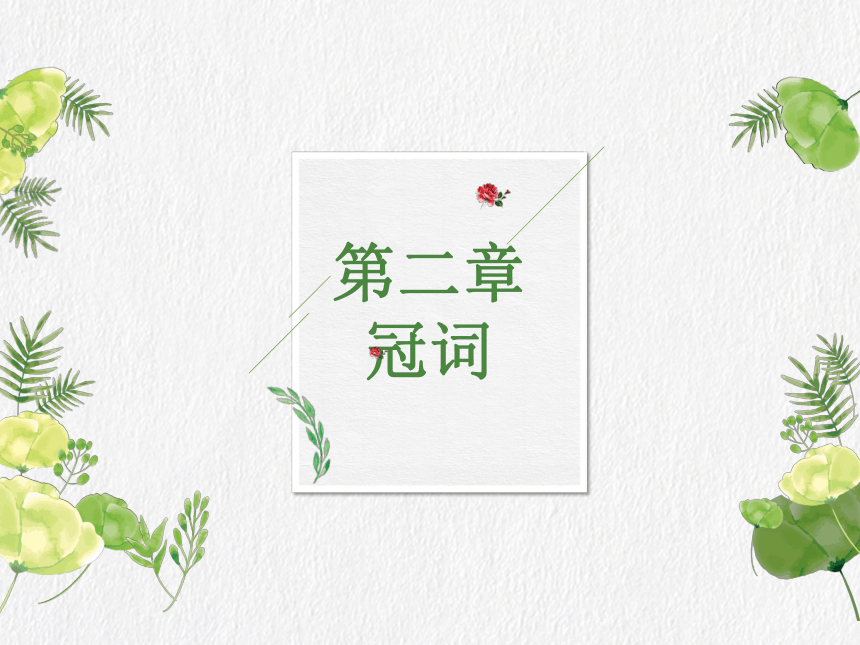 | |
| 格式 | pptx | ||
| 文件大小 | 8.8MB | ||
| 资源类型 | 教案 | ||
| 版本资源 | 通用版 | ||
| 科目 | 英语 | ||
| 更新时间 | 2025-06-26 07:29:40 | ||
图片预览

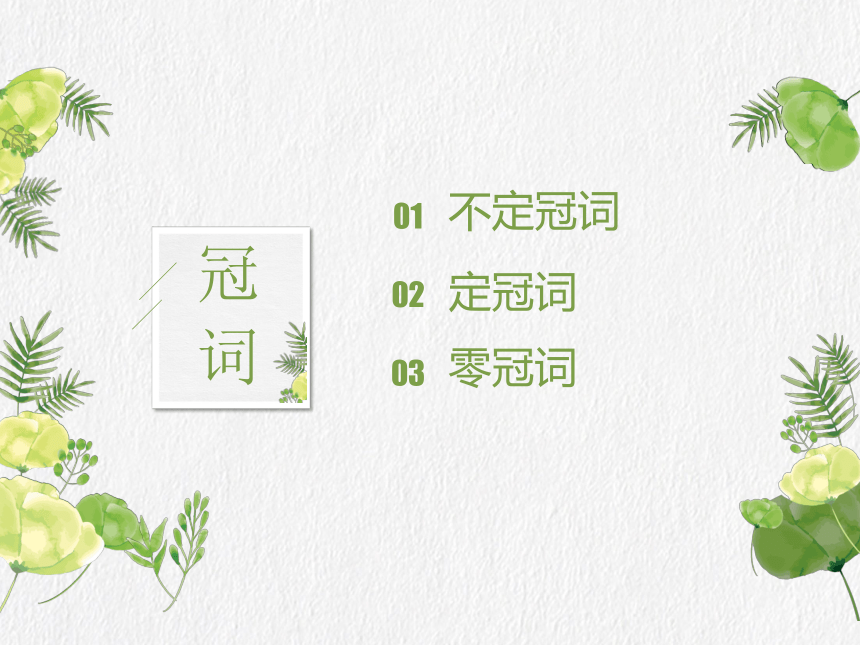
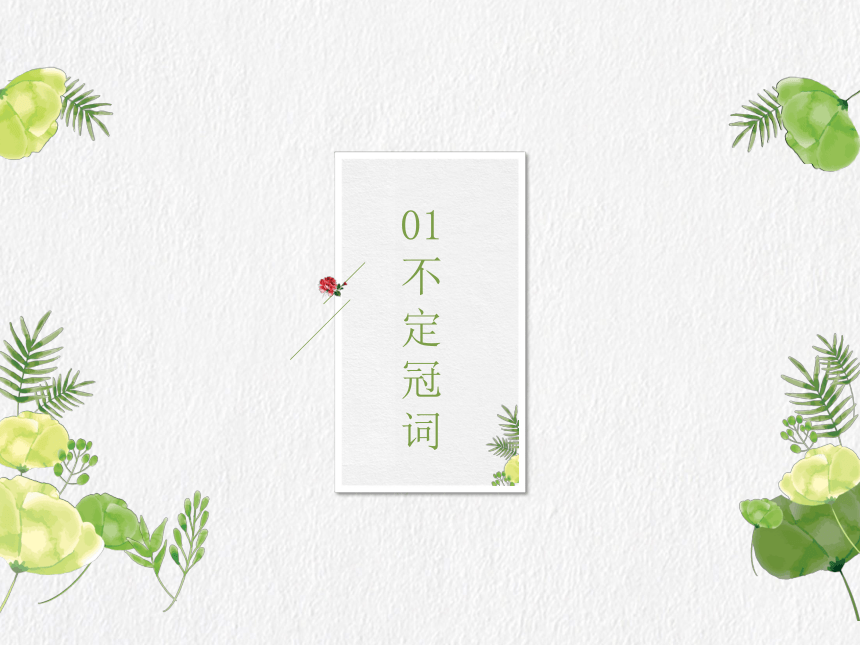
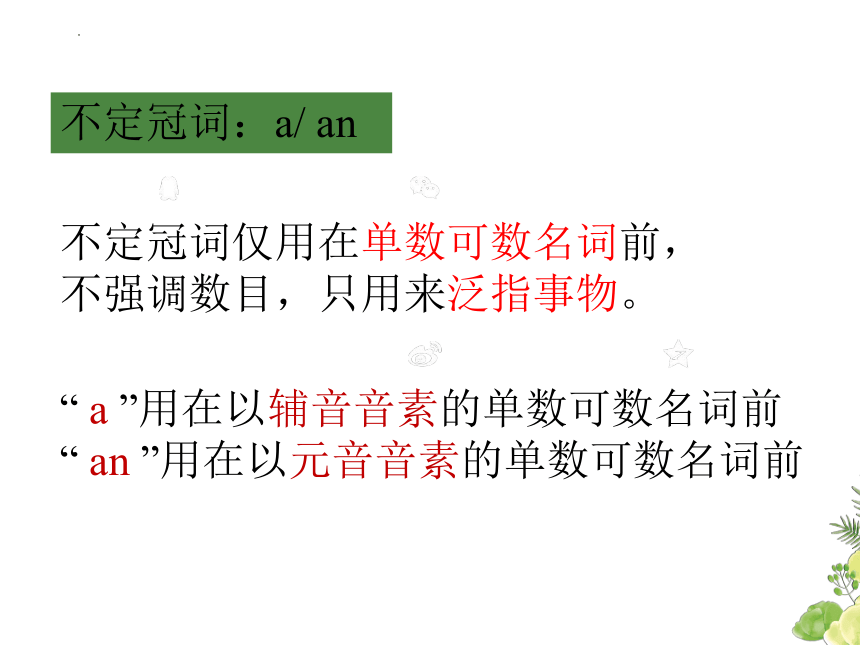
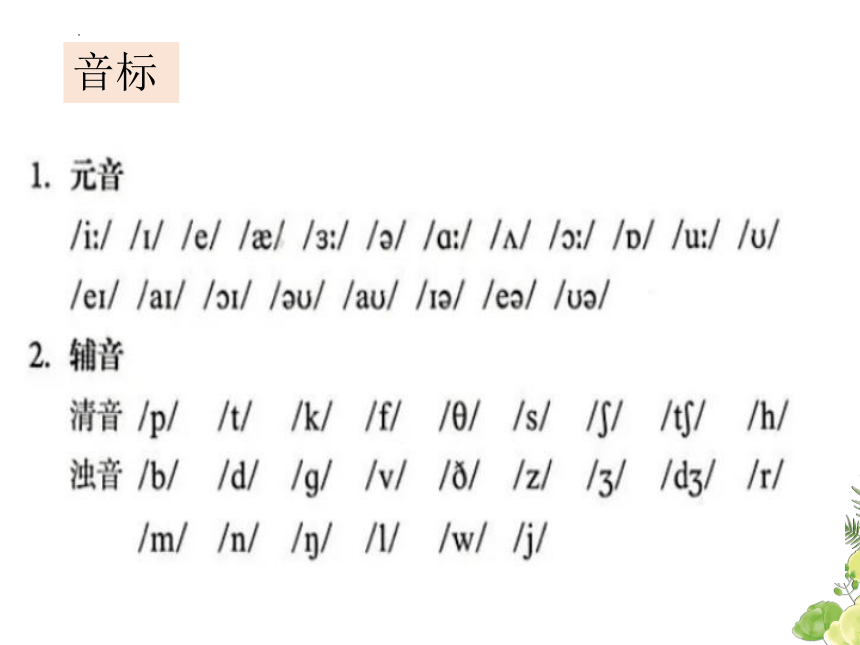
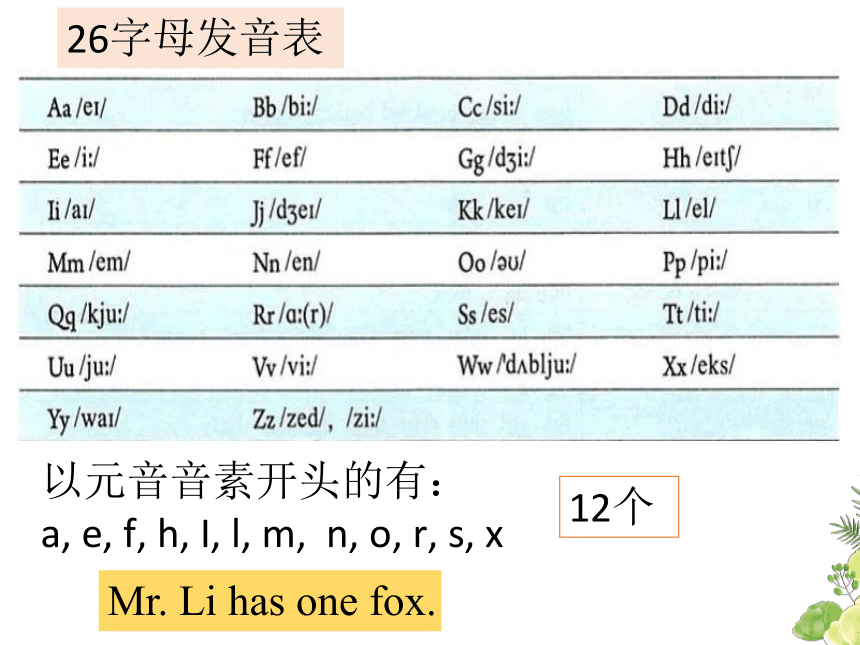
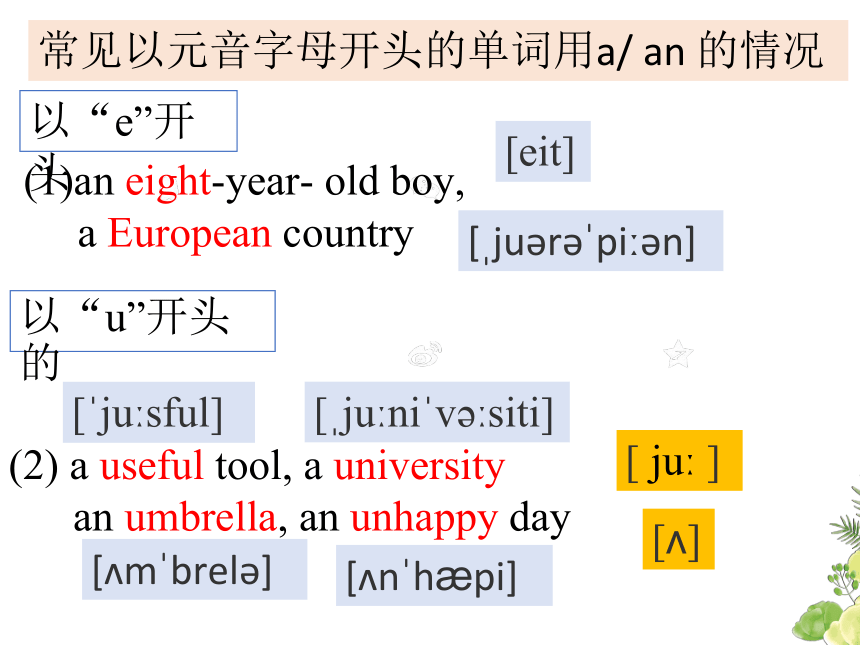
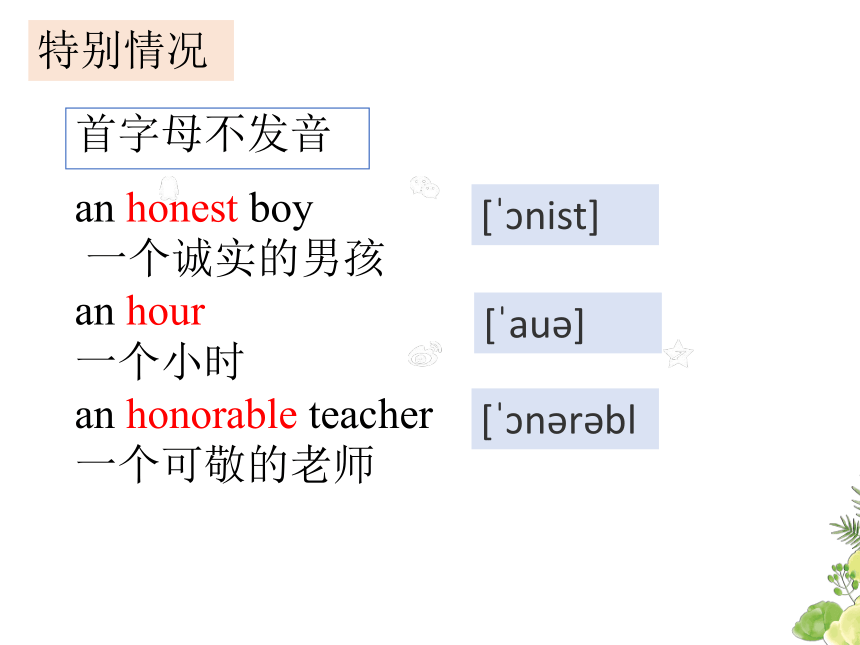
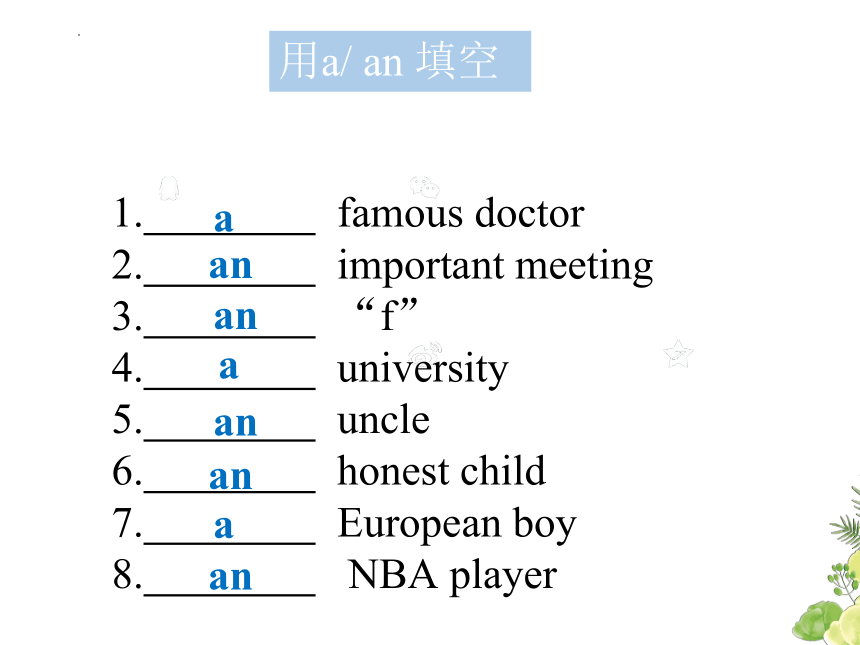
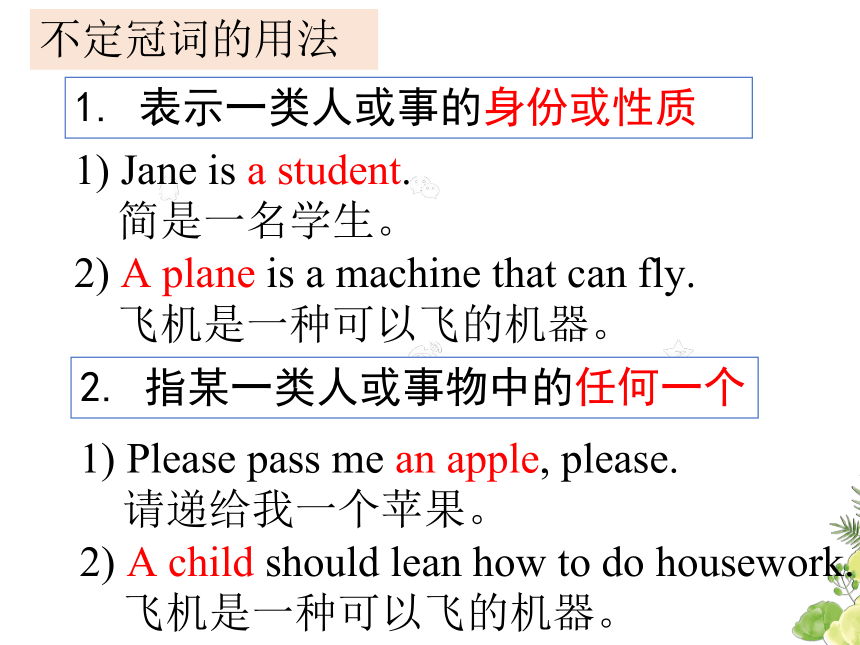
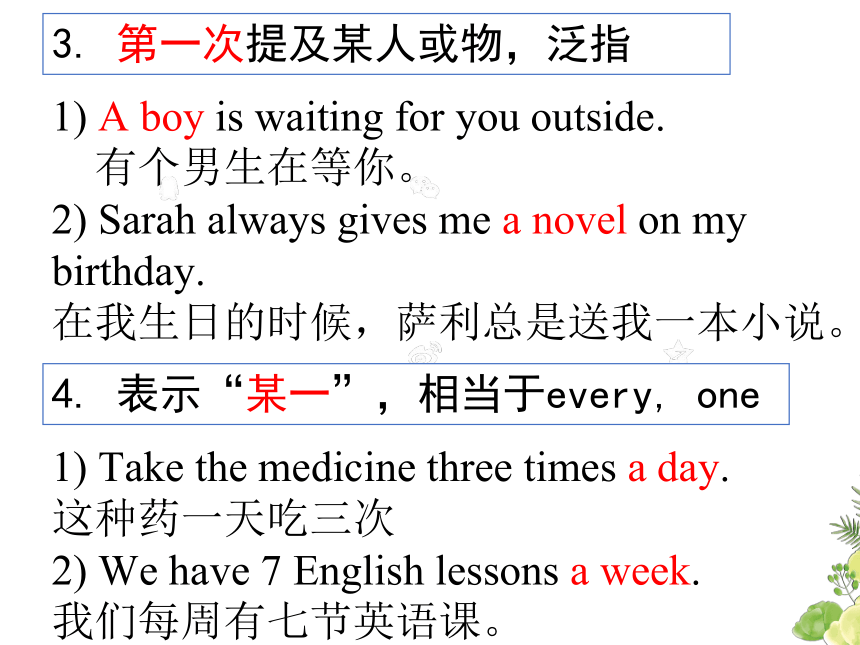
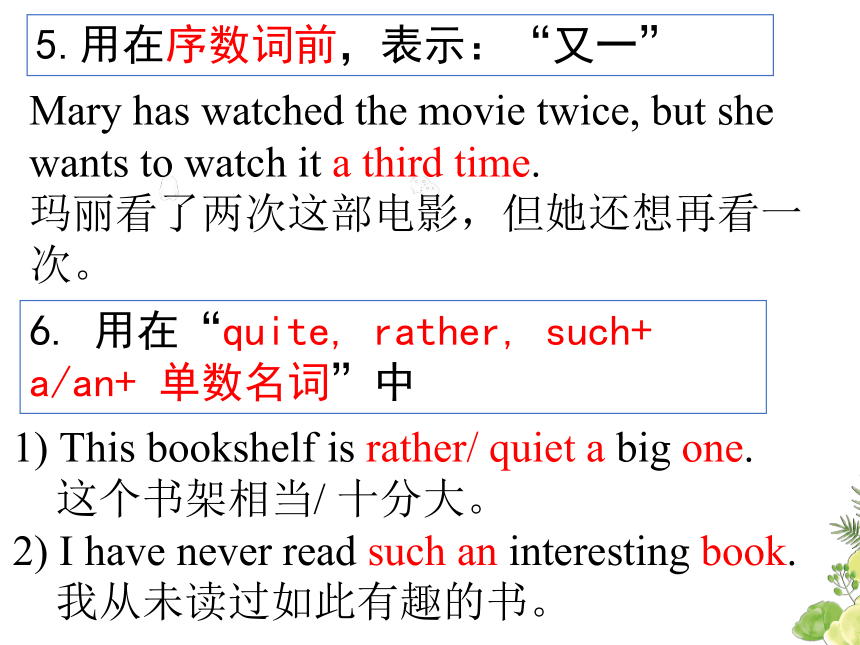
文档简介
(共44张PPT)
第二章
冠词
冠
词
03
01
02
不定冠词
定冠词
零冠词
01
不定冠词
不定冠词:a/ an
不定冠词仅用在单数可数名词前,不强调数目,只用来泛指事物。
“ a ”用在以辅音音素的单数可数名词前
“ an ”用在以元音音素的单数可数名词前
音标
26字母发音表
以元音音素开头的有:
a, e, f, h, I, l, m, n, o, r, s, x
12个
Mr. Li has one fox.
常见以元音字母开头的单词用a/ an 的情况
(1)an eight-year- old boy,
a European country
(2) a useful tool, a university
an umbrella, an unhappy day
[ ju sful]
[ ju ni v siti]
[ m brel ]
[ n h pi]
以“e”开头
以“u”开头的
[ ju r pi n]
[eit]
[ ju ]
[ ]
特别情况
an honest boy
一个诚实的男孩
an hour
一个小时
an honorable teacher
一个可敬的老师
[ nist]
[ au ]
[ n r bl
首字母不发音
用a/ an 填空
1. famous doctor
2. important meeting
3. “f”
4. university
5. uncle
6. honest child
7. European boy
8. NBA player
an
a
an
an
a
an
a
an
1) Jane is a student.
简是一名学生。
2) A plane is a machine that can fly.
飞机是一种可以飞的机器。
不定冠词的用法
1. 表示一类人或事的身份或性质
1) Please pass me an apple, please.
请递给我一个苹果。
2) A child should lean how to do housework.
飞机是一种可以飞的机器。
2. 指某一类人或事物中的任何一个
1) A boy is waiting for you outside.
有个男生在等你。
2) Sarah always gives me a novel on my birthday.
在我生日的时候,萨利总是送我一本小说。
3. 第一次提及某人或物,泛指
4. 表示“某一”,相当于every, one
1) Take the medicine three times a day.
这种药一天吃三次
2) We have 7 English lessons a week.
我们每周有七节英语课。
1) This bookshelf is rather/ quiet a big one.
这个书架相当/ 十分大。
2) I have never read such an interesting book.
我从未读过如此有趣的书。
6. 用在“quite, rather, such+ a/an+ 单数名词”中
Mary has watched the movie twice, but she wants to watch it a third time.
玛丽看了两次这部电影,但她还想再看一次。
5.用在序数词前,表示:“又一”
What a powerful country China is!
中国是个多么强大的国家啊!
What a beautiful girl!
多么漂亮的女孩啊!
in a hurry 匆忙 have a fever 发烧
go for a walk 去散步 make a living 谋生
half an hour 半小时
7.用在what+a/an+形容词+名词+(主语+谓语)的感叹句中
8.用在某些固定词组中
9.使物质或抽象名词具体化,表示“一次,一种,一场等”
It is a pleasure to talk to you.
与你交谈很愉快。
The party is a big success.
这次聚会非常成功。
02
定冠词
定冠词:the
不定冠词仅用在单复数名词或不可数名词前,表特指。
定冠词的用法
The horse is a useful animal
马是一种有用的动物。
1. 表示一类人或物
The rich should help the poor.
富人应该帮助穷人。
The young like playing games.
年轻人喜欢玩游戏。
2. the+形容词 表示一类人
谓语动词用复数
like
1)I hope that I can visit the moon one day
我希望我有一天能游览月球。
2)The earth moves around the sun.
地球围绕着太阳转。
1)The Yangtze River is longest river in China.
长江是中国最长的河流。
2)The Poyang Lake is located in Jiujiang.
鄱阳湖位于九江市。
3. 用于独一无二的名词前
4. 用于江河湖海、山川、群岛前
Last week, Jane’s father bought her a new iPhone. The iPhone cost him 6000 yuan.
上周,简的爸爸给她买了一个新的iPhone,花了他六千块。
5. the+姓氏复数,表示一家人或夫妇
6. 表示双方都了解或上文提过的人或物
The Greens work in the same company.
格林父母在同一家公司上班。
The Blacks are cleaning the house.
布莱克一家正在打扫房子。
谓语动词用复数
are
work
7. 用于西洋乐器前
8. the+序数词/形容词最高级/副词最高级
play the violin/ guitar/ piano/ drum
拉小提琴/ 弹吉他/ 弹钢琴/ 打鼓
He is the first person to come here.
他是第一个来这里的人。
This is the best film I have ever seen.
这是我看过最好看的一部电影。
9. 用于方位名词、身体部位名词前
The sun rises in the east.
太阳从东方升起。
He holds me by the hands.
他用手抓住我。
the Great Wall 长城
the Summer Palace 颐和园
the United States 美国
10. 用于某些普通名词构成的专有名词前
11. in+the+年份的复数 “在某世纪的某年代”
in the 1990s 在20世纪90年代
in the 2020s 在21世纪20年代
12. 固定搭配中
all the time 一直
by the way 顺便问一下
in the middle of 在……的中间
in the morning 在早上
the same as 和……一样
13. 名词后有后置定语(定语从句、介词短语等)
The bike I bought yesterday was lost this morning.
我昨天买的自行车,今天早上弄丢了。
I don’t know the woman under the tree.
我不知道那个在树下的女人。
Do you know the boy that is sitting near the window
你知道那个正坐在窗边的男孩子吗?
I bought yesterday
under the tree
that is sitting near the
window
14. 我国用festival构成的传统节日前加the
the Spring Festival 春节
the Lantern Festival 元宵节
the Qingming Festival 清明节
the Dragon Boat Festival 端午节
the Mid-Autumn Festival 中秋节
the Double Ninth Festival 重阳节
辨析
Mary has watched the movie twice, but she wants to watch it a third time.
玛丽看了两次这部电影,但她还想再看一次。
He is the first person to come here.
他是第一个来这里的人。
a+序数词,表示:“又一;再一”
the+序数词,表示:“第几……”
特别提醒
All the students are in the playground.
所有学生都在操场上。
They have finished half the work.
他们已经完成了工作的一半
Both the sweaters are made in the USA.
这两件毛衣都是美国制造的。
all/ half/ both/ double等 + the
03
零冠词
零冠词的用法
1.专有名词前,如国名,地名,人名等
China is a great country.
中国是一个伟大的国家。
Mary lives in New York.
玛丽住在纽约。
2.名词前有指示代词、物主代词或名词所有格修饰时
Every students likes English in our class.
在我们班里,每个学生都喜欢英语。
I can’t visit you this weekend.
3.(1)年、月、星期前不用冠词
I was born in 2005.
我出生于2005年。
We often plant trees in March.
我们经常在三月份种树。
I can go home on Friday.
我周五可以回家。
3.(2)三餐前不用冠词,但有形容词,需用不定冠词
I had breakfast this morning.
I will have a big dinner this evening.
had breakfast
have a big dinner
3.(3)
季节前不用冠词,特指某一年的用the;
节假日前不用冠词,中国传统节日用the
He was born in winter.
他在冬天出生。
He was born in the winter of 1998.
他出生于1998年的冬天。
We enjoyed ourselves on Thanksgiving.
我们在感恩节过得很愉快。
The Qingming Festival is coming soon.
清明节就来了。
1) This is Professor Li.
这是李教授。
2) Lincoln was made President of America.
林肯当上了美国总统。
4.职位、头衔、身份前不用冠词
1) They like English very much.
2) She can speak Japanese.
3) We play ping-pong in PE class.
4) I like playing chess.
5.学科,语言,球类,棋类前不用冠词
1) I go to school by bus/ bike.
2) My sister goes to Guangzhou by air.
6.与by连用的交通工具前不用冠词,by+交通工具
Would you like to use chopsticks or knife and fork
你想用筷子还是刀叉呢?
7.and连接的两个相对的名词并用时
on foot
步行
Horses are useful animals.
马是有用的动物。
9.表示泛指的复数名词前不用冠词
go to school 去上学(学生)
go to bed 上床睡觉
at school 在上学
at table 在吃饭
in bed (躺、睡)在床上
in hospital 因病住院
10.固定词组
*特别提醒 有些名词前用或不用冠词, 其意义有所不同。如:
(1)go to school 去上学 (是学生)
go to the school 到学校去 (不一定是学生)
(2)go to bed 上床睡觉
go to the bed 走到床前 (不一定是去睡觉)
(3)at school 在上学
at the school 在学校里
(4)at table 在吃饭
at the table 在桌子旁
(5)in bed (躺、睡)在床上
in the bed (某物)在床上
无the表示状态/ 目的
(6)in hospital 因病住院
in the hospital 在医院里 (不一定是病人)
(7)in class 在上课
in the class 在班级里
(8)in future 今后
in the future 将来
(9)in front of 在……(外部)的前面
in the front of 在……(内部的)前面
(10)next year 明年
the next year 第二年
Practice
一、请在空格中填入恰当的冠词(an, a, the 或 /)
1. ____ girl in red is waiting for you at the gate.
2. Yesterday, Mike told me_____ interesting story.
_____ story is about aliens.
3. Lily is____ most hard-working student in our class.
4. Guangdong is in_____ south of____ China.
5s. ____ Great Wall is crowded on____ National Day.
The
an
The
the
the
The
/
/
二、单项选择
( )1. Sally wants to lose weight. She just has ___ cup of milk for ___ breakfast every day.
A. a ; / B. a; the
C. the; a D. the; /
( )2. --Would you like ____ red dress as a birthday present, Mary
--Sorry, Mom. I prefer ________ orange one.
A. an; an B. a; a
C. an; a D. a; an
A
D
( )3. --Who's that girl
--You mean ___ one with long blond hair That's Jack's daughter.
A. a B. an
C. the D. /
( )4. ___ Smiths are planning a visit to Europe after their daughter graduates from
high school.
A. The B. An
C. / D. A
C
A
( )5. --What's the matter with you
--I caught ___ bad cold and had to stay in
bed.
A. a; / B. a; the
C. a; a D. the; the
( )6. --What ____ bad weather it is today!
--Yes, _____ weather makes me so sad.
A. a; the B. /; the
C. an; the D. the; a
A
B
( )7. David is such ___ wonderful teacher that I have ___ great fun in his class!
A. a; the B. a; /
C. a; a D. the; /
( )8. (2020 四川)Bruce likes playing ____ soccer, so his father bought him ___ soccer ball.
A. a; an B. the; a
C. /; the D. /; a
B
D
( )9. It's __ pity that many wild animals are now in danger. Please have ___ pity on them since they are part of our big family.
A. a; / B. a; a
C. /; a D. /; /
( ) 10. What ____ unusual school trip we had! I will never forget it.
A. a B. an C. the D. /
A
B
Jeff almost went mad when his elder brother was killed in 1. car accident. He refused to play 2. soccer or go to the movies with his friends. Instead, he just sat in his bedroom and didn’t talk to anyone, even his parents. Jeff felt that 3. world was unfair. He was quite angry with 4. driver because his car hit his brother, even though it was 5. accident.
a
the
三、用a、an、the或 / 填空
/
the
an
Thank
you
第二章
冠词
冠
词
03
01
02
不定冠词
定冠词
零冠词
01
不定冠词
不定冠词:a/ an
不定冠词仅用在单数可数名词前,不强调数目,只用来泛指事物。
“ a ”用在以辅音音素的单数可数名词前
“ an ”用在以元音音素的单数可数名词前
音标
26字母发音表
以元音音素开头的有:
a, e, f, h, I, l, m, n, o, r, s, x
12个
Mr. Li has one fox.
常见以元音字母开头的单词用a/ an 的情况
(1)an eight-year- old boy,
a European country
(2) a useful tool, a university
an umbrella, an unhappy day
[ ju sful]
[ ju ni v siti]
[ m brel ]
[ n h pi]
以“e”开头
以“u”开头的
[ ju r pi n]
[eit]
[ ju ]
[ ]
特别情况
an honest boy
一个诚实的男孩
an hour
一个小时
an honorable teacher
一个可敬的老师
[ nist]
[ au ]
[ n r bl
首字母不发音
用a/ an 填空
1. famous doctor
2. important meeting
3. “f”
4. university
5. uncle
6. honest child
7. European boy
8. NBA player
an
a
an
an
a
an
a
an
1) Jane is a student.
简是一名学生。
2) A plane is a machine that can fly.
飞机是一种可以飞的机器。
不定冠词的用法
1. 表示一类人或事的身份或性质
1) Please pass me an apple, please.
请递给我一个苹果。
2) A child should lean how to do housework.
飞机是一种可以飞的机器。
2. 指某一类人或事物中的任何一个
1) A boy is waiting for you outside.
有个男生在等你。
2) Sarah always gives me a novel on my birthday.
在我生日的时候,萨利总是送我一本小说。
3. 第一次提及某人或物,泛指
4. 表示“某一”,相当于every, one
1) Take the medicine three times a day.
这种药一天吃三次
2) We have 7 English lessons a week.
我们每周有七节英语课。
1) This bookshelf is rather/ quiet a big one.
这个书架相当/ 十分大。
2) I have never read such an interesting book.
我从未读过如此有趣的书。
6. 用在“quite, rather, such+ a/an+ 单数名词”中
Mary has watched the movie twice, but she wants to watch it a third time.
玛丽看了两次这部电影,但她还想再看一次。
5.用在序数词前,表示:“又一”
What a powerful country China is!
中国是个多么强大的国家啊!
What a beautiful girl!
多么漂亮的女孩啊!
in a hurry 匆忙 have a fever 发烧
go for a walk 去散步 make a living 谋生
half an hour 半小时
7.用在what+a/an+形容词+名词+(主语+谓语)的感叹句中
8.用在某些固定词组中
9.使物质或抽象名词具体化,表示“一次,一种,一场等”
It is a pleasure to talk to you.
与你交谈很愉快。
The party is a big success.
这次聚会非常成功。
02
定冠词
定冠词:the
不定冠词仅用在单复数名词或不可数名词前,表特指。
定冠词的用法
The horse is a useful animal
马是一种有用的动物。
1. 表示一类人或物
The rich should help the poor.
富人应该帮助穷人。
The young like playing games.
年轻人喜欢玩游戏。
2. the+形容词 表示一类人
谓语动词用复数
like
1)I hope that I can visit the moon one day
我希望我有一天能游览月球。
2)The earth moves around the sun.
地球围绕着太阳转。
1)The Yangtze River is longest river in China.
长江是中国最长的河流。
2)The Poyang Lake is located in Jiujiang.
鄱阳湖位于九江市。
3. 用于独一无二的名词前
4. 用于江河湖海、山川、群岛前
Last week, Jane’s father bought her a new iPhone. The iPhone cost him 6000 yuan.
上周,简的爸爸给她买了一个新的iPhone,花了他六千块。
5. the+姓氏复数,表示一家人或夫妇
6. 表示双方都了解或上文提过的人或物
The Greens work in the same company.
格林父母在同一家公司上班。
The Blacks are cleaning the house.
布莱克一家正在打扫房子。
谓语动词用复数
are
work
7. 用于西洋乐器前
8. the+序数词/形容词最高级/副词最高级
play the violin/ guitar/ piano/ drum
拉小提琴/ 弹吉他/ 弹钢琴/ 打鼓
He is the first person to come here.
他是第一个来这里的人。
This is the best film I have ever seen.
这是我看过最好看的一部电影。
9. 用于方位名词、身体部位名词前
The sun rises in the east.
太阳从东方升起。
He holds me by the hands.
他用手抓住我。
the Great Wall 长城
the Summer Palace 颐和园
the United States 美国
10. 用于某些普通名词构成的专有名词前
11. in+the+年份的复数 “在某世纪的某年代”
in the 1990s 在20世纪90年代
in the 2020s 在21世纪20年代
12. 固定搭配中
all the time 一直
by the way 顺便问一下
in the middle of 在……的中间
in the morning 在早上
the same as 和……一样
13. 名词后有后置定语(定语从句、介词短语等)
The bike I bought yesterday was lost this morning.
我昨天买的自行车,今天早上弄丢了。
I don’t know the woman under the tree.
我不知道那个在树下的女人。
Do you know the boy that is sitting near the window
你知道那个正坐在窗边的男孩子吗?
I bought yesterday
under the tree
that is sitting near the
window
14. 我国用festival构成的传统节日前加the
the Spring Festival 春节
the Lantern Festival 元宵节
the Qingming Festival 清明节
the Dragon Boat Festival 端午节
the Mid-Autumn Festival 中秋节
the Double Ninth Festival 重阳节
辨析
Mary has watched the movie twice, but she wants to watch it a third time.
玛丽看了两次这部电影,但她还想再看一次。
He is the first person to come here.
他是第一个来这里的人。
a+序数词,表示:“又一;再一”
the+序数词,表示:“第几……”
特别提醒
All the students are in the playground.
所有学生都在操场上。
They have finished half the work.
他们已经完成了工作的一半
Both the sweaters are made in the USA.
这两件毛衣都是美国制造的。
all/ half/ both/ double等 + the
03
零冠词
零冠词的用法
1.专有名词前,如国名,地名,人名等
China is a great country.
中国是一个伟大的国家。
Mary lives in New York.
玛丽住在纽约。
2.名词前有指示代词、物主代词或名词所有格修饰时
Every students likes English in our class.
在我们班里,每个学生都喜欢英语。
I can’t visit you this weekend.
3.(1)年、月、星期前不用冠词
I was born in 2005.
我出生于2005年。
We often plant trees in March.
我们经常在三月份种树。
I can go home on Friday.
我周五可以回家。
3.(2)三餐前不用冠词,但有形容词,需用不定冠词
I had breakfast this morning.
I will have a big dinner this evening.
had breakfast
have a big dinner
3.(3)
季节前不用冠词,特指某一年的用the;
节假日前不用冠词,中国传统节日用the
He was born in winter.
他在冬天出生。
He was born in the winter of 1998.
他出生于1998年的冬天。
We enjoyed ourselves on Thanksgiving.
我们在感恩节过得很愉快。
The Qingming Festival is coming soon.
清明节就来了。
1) This is Professor Li.
这是李教授。
2) Lincoln was made President of America.
林肯当上了美国总统。
4.职位、头衔、身份前不用冠词
1) They like English very much.
2) She can speak Japanese.
3) We play ping-pong in PE class.
4) I like playing chess.
5.学科,语言,球类,棋类前不用冠词
1) I go to school by bus/ bike.
2) My sister goes to Guangzhou by air.
6.与by连用的交通工具前不用冠词,by+交通工具
Would you like to use chopsticks or knife and fork
你想用筷子还是刀叉呢?
7.and连接的两个相对的名词并用时
on foot
步行
Horses are useful animals.
马是有用的动物。
9.表示泛指的复数名词前不用冠词
go to school 去上学(学生)
go to bed 上床睡觉
at school 在上学
at table 在吃饭
in bed (躺、睡)在床上
in hospital 因病住院
10.固定词组
*特别提醒 有些名词前用或不用冠词, 其意义有所不同。如:
(1)go to school 去上学 (是学生)
go to the school 到学校去 (不一定是学生)
(2)go to bed 上床睡觉
go to the bed 走到床前 (不一定是去睡觉)
(3)at school 在上学
at the school 在学校里
(4)at table 在吃饭
at the table 在桌子旁
(5)in bed (躺、睡)在床上
in the bed (某物)在床上
无the表示状态/ 目的
(6)in hospital 因病住院
in the hospital 在医院里 (不一定是病人)
(7)in class 在上课
in the class 在班级里
(8)in future 今后
in the future 将来
(9)in front of 在……(外部)的前面
in the front of 在……(内部的)前面
(10)next year 明年
the next year 第二年
Practice
一、请在空格中填入恰当的冠词(an, a, the 或 /)
1. ____ girl in red is waiting for you at the gate.
2. Yesterday, Mike told me_____ interesting story.
_____ story is about aliens.
3. Lily is____ most hard-working student in our class.
4. Guangdong is in_____ south of____ China.
5s. ____ Great Wall is crowded on____ National Day.
The
an
The
the
the
The
/
/
二、单项选择
( )1. Sally wants to lose weight. She just has ___ cup of milk for ___ breakfast every day.
A. a ; / B. a; the
C. the; a D. the; /
( )2. --Would you like ____ red dress as a birthday present, Mary
--Sorry, Mom. I prefer ________ orange one.
A. an; an B. a; a
C. an; a D. a; an
A
D
( )3. --Who's that girl
--You mean ___ one with long blond hair That's Jack's daughter.
A. a B. an
C. the D. /
( )4. ___ Smiths are planning a visit to Europe after their daughter graduates from
high school.
A. The B. An
C. / D. A
C
A
( )5. --What's the matter with you
--I caught ___ bad cold and had to stay in
bed.
A. a; / B. a; the
C. a; a D. the; the
( )6. --What ____ bad weather it is today!
--Yes, _____ weather makes me so sad.
A. a; the B. /; the
C. an; the D. the; a
A
B
( )7. David is such ___ wonderful teacher that I have ___ great fun in his class!
A. a; the B. a; /
C. a; a D. the; /
( )8. (2020 四川)Bruce likes playing ____ soccer, so his father bought him ___ soccer ball.
A. a; an B. the; a
C. /; the D. /; a
B
D
( )9. It's __ pity that many wild animals are now in danger. Please have ___ pity on them since they are part of our big family.
A. a; / B. a; a
C. /; a D. /; /
( ) 10. What ____ unusual school trip we had! I will never forget it.
A. a B. an C. the D. /
A
B
Jeff almost went mad when his elder brother was killed in 1. car accident. He refused to play 2. soccer or go to the movies with his friends. Instead, he just sat in his bedroom and didn’t talk to anyone, even his parents. Jeff felt that 3. world was unfair. He was quite angry with 4. driver because his car hit his brother, even though it was 5. accident.
a
the
三、用a、an、the或 / 填空
/
the
an
Thank
you
同课章节目录
- 词法
- 名词
- 动词和动词短语
- 动词语态
- 动词时态
- 助动词和情态动词
- 非谓语动词
- 冠词
- 代词
- 数词和量词
- 形容词副词及其比较等级
- 介词和介词短语
- 连词和感叹词
- 构词法
- 相似、相近词比较
- 句法
- 陈述句
- 一般疑问句和否定疑问句
- 特殊疑问句及选择疑问句
- 反意疑问句
- 存在句(There be句型)
- 宾语从句
- 定语从句
- 状语从句
- 主谓一致问题
- 简单句
- 并列句
- 复合句
- 主谓一致
- 主、表语从句
- 名词性从句
- 直接引语和间接引语
- 虚拟语气
- 感叹句
- 强调句
- 倒装句
- 祈使句
- 句子的成分
- 句子的分类
- 题型专区
- 单项选择部分
- 易错题
- 完形填空
- 阅读理解
- 词汇练习
- 听说训练
- 句型转换
- 补全对话
- 短文改错
- 翻译
- 书面表达
- 任务型阅读
- 语法填空
- 其他资料
